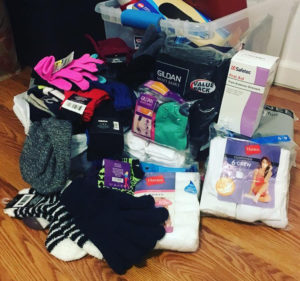SOL Collective isn’t waiting for a safe injection site to aid those with opioid addiction
 February 6, 2018
Category: Feature, Featured, Medium, Method
February 6, 2018
Category: Feature, Featured, Medium, Method
Tampons, pads and hand warmers. Clean needle kits and Narcan. Wound care kits. New socks.
The volunteers of harm reduction group SOL Collective are equipped with a variety of these items when they walk through the Kensington area to meet community members at risk of opioid overdose.
The horizontally structured organization is made up of 30 to 40 activists, doctors, medical students, nurses, people in recovery, people in active addiction, family members and others who care about getting life-saving care to those living with addiction.
Their work is just one example of how Philadelphians — policymakers, politicians, citizens — are attempting to curb the epidemic that killed 1,200 people last year.
At SOL Collective outreach outings, every volunteer has a role. The doctors, medical students and nurses might address wound care, while others might collect narratives from the community to inform advocacy and future outreach.
The group also conducts training on overdose reversal for community health workers and holds informational meetings for neighborhood groups.
“Harm reduction” is a set of public health principles that, first, make sure people with addiction are safe and get the medical attention and supportive services they need, whether they’re actively using or in recovery.
It’s about “meeting people where they’re at,” said Christina Garcés, cofounder of SOL Collective and a medical student at Temple University.
Garcés emphasized the importance of the recovery process — but still, she said, “if you want people to recover, you need to keep them alive.”
This philosophy extends to safe injection facilities (SIFs), or sites where people can inject illicit drugs under medical supervision, thus allowing them to receive care quickly in the case of an overdose.
In an essay she penned on Medium, Garcés explained that safe injection facilities “also provide supportive services such as wound care, HIV testing, and referrals to substance abuse treatment programs” and applauded Philadelphia officials’ decision to support the explore the possible opening of a safe injection facility, announced on Jan. 23. She wrote:
“Numerous studies have been published confirming SIFs as a viable public health intervention, consistently concluding that they stop overdose deaths, get people into treatment, reduce spread of infectious disease, and decrease incidence of public injection and drug-related litter in their surrounding communities.”
A priority for SOL Collective volunteers is centering user experiences at the heart of the conversation about safe injection facilities. Some critics of the city’s process for planning such a site say that user voices haven’t been incorporated enough.
“Those voices are who should be driving,” said Garcés.
Another desired outcome for the group’s advocacy is to broaden the scope of safe injection facilities so they can instead be called “safe consumption sites.” This distinction implies that the facilities would allow for drug use beyond injection drugs.
“One cannot say that one type of drug use deserves safety and care and compassion, while leaving other folks out in the cold,” SOL Collective member Adrienne Standley said via email. “A site must be comprehensive and engage many different communities, and if this is not the case, we plan to fight and advocate for inclusive sites.”
And if the city does follow through on its plans to allow the opening of such a facility, SOL Collective expects its own work to shift while keeping with its ultimate mission: saving lives.
“Our mission may develop as the situation changes, an our outreach may move, expand, or change focus depending on need,” Standley said, “but we will continue to grow and mature and work with our communities to hopefully move towards a safer and more compassionate Philadelphia.”
Trending News










